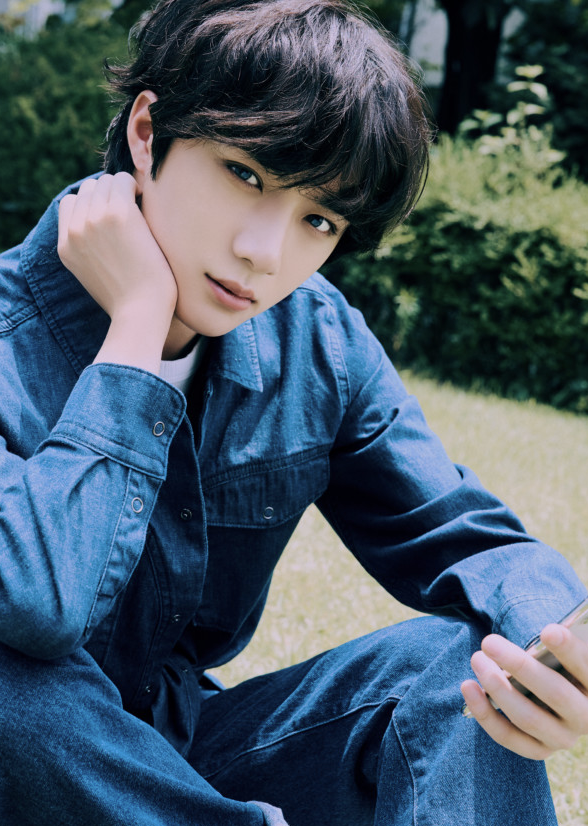
TXT is quite an anomaly in the current K-pop scene. While many of their male peers release hard-hitting electronic songs, TXT instead wraps themselves in the mantle of a softer, sweeter concept: youth.
Yet “youth” isn’t always pure sunshine and giggles — it’s also a transitional period of uncertainty and self-doubt. In their latest mini-album minisode1, TXT tackles the theme of youth through various lenses: bright-eyed innocence, sad regret and longing, and endless optimism. minisode1 distills these myriad emotions into a taut album brimming with gorgeous melodies and inventive soundscapes.
“Blue Hour,” the album’s title track, fuses a throwback disco groove with TXT’s trademark youthful charm. The song has few modulations or sharp changes, which is an interesting choice given K-pop’s love affair with instrumental drops and experimental breakdowns. Although “Blue Hour” does not have an immediately memorable melody, its consistently upbeat energy proves hard to resist.
Lyrically, “Blue Hour” explores the magic of dusk. The boys sing, “The other world at 5:53 is beautiful,” going on to rhapsodize about the “imagination” of this special hour.
“Blue Hour” also seemingly references “Blue Orangeade,” a debut-era b-side, through lyrics like “orange-glowing magic.” This Easter egg is emblematic of TXT’s consistent youthful messaging, while also providing gorgeous imagery.
Interestingly enough, “Blue Hour” reads like the perfect counterpart to BTS’s song “4 O’Clock.” While “Blue Hour” is a fizzy rush of endorphins, “4 O’Clock” is an emotional ode to the quiet beauty of early mornings, when the gentle moonlight provides a reprieve from the pains of daytime. The two approaches — euphoric pop and poetic artistry — are complete opposites, both have their own merits. “Blue Hour” makes a stunning case for TXT’s own identity, completely distinct from that of their agency seniors; it’s a lovely diversification of the Bighit brand.

My one qualm with “Blue Hour” (and also minisode1 as a whole) is the vocal processing. Over the past few years, Bighit has started slathering their songs with heavy filters; both TXT and BTS have succumbed to this agency-specific production quirk. I’m not sure why the company thinks that robotic squeaking is a good sound — it’s not! — but the processing leaves the five members sounding eerily tinny.
Luckily, in “Ghosting,” the vocal effects actually suit the song well, lending a sense of ethereal otherworldliness. “Ghosting” is striking from the very first note, as Soobin’s vocals melt into a haze of distorted electric guitar. All the elements bleed together at the edges, perfectly suitable given the “ghost” concept.
Lyrically, the song speaks of a disappearing love:
All of a sudden you disappeared, dis-disappeared
Like a faint ghost, dis-disappeared
…
I blankly look at your newly posted
Hashtag ‘Today_TheSkyIs_SoPretty’
The mention of a pretty sky in “Ghosting” contrasts with the orange sky of “Blue Hour” — while the sky represents youthful magic and imagination in “Blue Hour,” that same sky becomes a heartrending reminder of an ended relationship in “Ghosting.” Through these two opposite interpretations of the sky, TXT expresses the joys and pains of youth, both the unending possibilities and easily crushed hopes.
TXT continues probing melancholy lyrical themes in “We Lost The Summer” and “Way Home.”
“We Lost The Summer” depicts pandemic lockdowns, with lyrics like “I hide my sigh behind this stuffy mask” and “This nightmarish week, now a month, a year.” The song never strays into overtly dark territory; the boys stick to singing about cancelled concerts and the lack of friendly meetups.

TXT’s avoidance of the coronavirus’s more serious consequences is perhaps fitting, since “We Lost The Summer” is comforting without ever becoming triggering. “We Lost The Summer” provides a safe oasis to momentarily escape the pandemic’s costly human and economic toll; the song’s bright synth loop and warm melodies are just as soothing as its lyrics.
In “Way Home,” TXT move on to the fear of growing up. They use sunset as a metaphor for change, singing:
I’m scared, it’s so strange
I’m somehow different from daytime
When I look back, the school is empty
The unfamiliar scene in the sunset
Like “Ghosting,” “Way Home” serves as a melancholy foil to “Blue Hour”’s delirious cheeriness. While “Blue Hour” views sunsets as a beautiful, magical phenomenon, “Way Home” instead interprets sunsets as a jarring reminder of evanescence and a symbol of unfamiliarity. These contrasting representations of a single motif provide depth and complexity to minisode1, showing that youth is both a wondrous and a terrifying time.

I’m also intrigued by TXT’s promise to support each other “so that no monsters can chase us anymore” in “Way Home.” The group has riffed on the monster theme several times in the past, with debut track “Crown,” where TXT fear that they have become a monster, and album track “Can’t We Just Leave The Monster Alive?” where they learn to see their internal monsters as unique personality traits.
In “Way Home,” however, TXT portray monsters as demons that can only be overcome with friendship. This new spin is their most generic interpretation of “monsters” yet, but it does help fuel the growing universe of lore surrounding the group.
TXT dial back the introspection and sadness with “Wishlist,” which is just as bubbly as “Blue Hour.” Rhythm guitar adds plenty of texture during the verses, but the chorus is the real draw here. “Wishlist” possesses one of TXT’s most propulsive choruses yet, with full-throated guitar, robust percussion, brassy accents, and even cheerleader chants.
The sweet-as-syrup lyrics describe TXT agonizing over a birthday gift for their crush. (“Wishlist”’s saccharine intention made me laugh since I couldn’t help comparing it to NCT U’s far less kid-friendly birthday song, “Make A Wish”). TXT even comb through their crush’s social media to find hints about preferred gifts. The use of social media as a possible romantic tool in “Wishlist” juxtaposes nicely with “Ghosting,” where social media only brings painful memories of an ex. Once again, TXT impresses with their very different takes on the same motif.

Also impressive is TXT’s participation in minisode1’s production. Taehyun, Yeonjun, and Huening Kai helped compose and write lyrics for “Wishlist,” while Taehyun and Soobin likewise assisted the production of “Ghosting.” That said, the TXT members are buried pretty far back in lengthy lists of contributors, so it’s unclear how much they actually shaped the two tracks. But since “Wishlist” and “Ghosting” are the standouts of minisode1, the members’ participation bodes well for their future creative growth.
“Wishlist” and “Ghosting” may shine brightly, but the other songs in minisode1 are no slouches either. It’s heartening to see such a nuanced, multipronged album about youth — a topic that’s often shafted with sickly-sweet lyrics devoid of meaning. TXT blend the expected innocent songs with more vulnerable tracks, and likewise slide effortlessly between the bright bubblegum pop of “Blue Hour” and the grungier, distorted guitar that characterizes “Ghosting.” With minisode1, TXT truly proves their status as K-pop’s standard-bearers of the “youthful” concept.
(YouTube [1][2]. Lyrics via Color Coded Lyrics. Images via Bighit Entertainment.)


